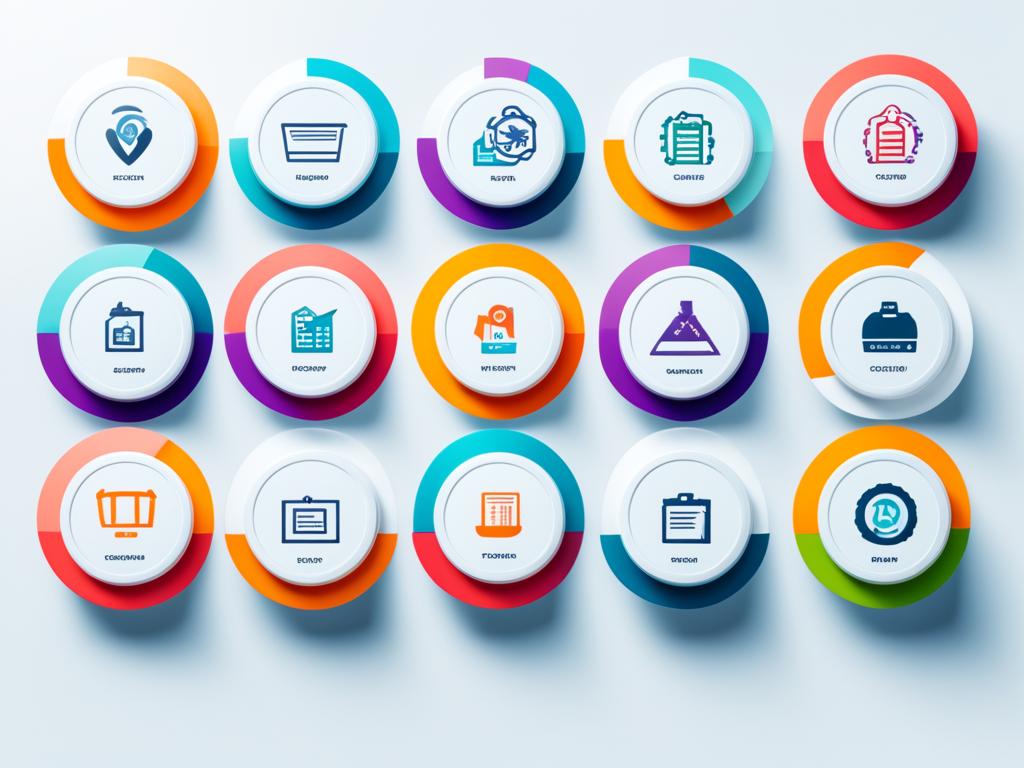Key Takeaways:
- Over 70% of midsize businesses are expected to adopt ERP software by 2024.
- ERP systems offer numerous advantages for midsize companies, including improved decision-making, reduced operational costs, and a competitive advantage.
- Key features of ERP systems for midsize companies include business function integration, task automation, data analysis and reporting, and industry-specific modules.
- When choosing an ERP system for your midsize business, consider factors such as features, price, scalability, and industry-specific support.
- Selecting the right ERP system can greatly enhance efficiency and foster growth for midsize businesses in 2024.
Advantages of ERP Systems for Midsize Companies
ERP systems provide numerous advantages for midsize companies, empowering them to enhance efficiency, streamline operations, and gain a competitive edge in the market. Let’s explore some key advantages of implementing an ERP system:1. Improved Decision-Making with ERP
ERP systems offer advanced analytics tools that enable businesses to make data-driven decisions. By consolidating data from various departments and processes, ERP systems provide real-time insights into sales, inventory, production, and finances. This holistic view allows decision-makers to identify trends, analyze performance, and make informed strategic choices that drive business growth.2. Operational Cost Reduction with ERP
Implementing an ERP system automates manual tasks, reducing the need for extensive manual data entry and paperwork. By automating routine processes such as payroll, invoicing, and inventory management, businesses can significantly reduce labor costs and improve operational efficiency. ERP systems also facilitate better resource utilization by optimizing inventory levels, minimizing waste, and streamlining supply chain management.3. Data Integrity with ERP
ERP systems play a vital role in maintaining data integrity by bringing together disparate databases into a single source of truth. This integration eliminates data duplication and inconsistencies, ensuring accurate and reliable information across the organization. With data integrity assured, businesses can make confident decisions based on up-to-date and accurate information, fostering transparency and trust.4. Competitive Advantage with ERP
One of the significant benefits of ERP systems is the competitive advantage they provide. By automating processes, optimizing workflows, and enhancing collaboration, ERP systems increase overall operational efficiency. This efficiency translates into faster response times, improved customer satisfaction, and the ability to adapt to market changes swiftly. With ERP’s robust features, businesses can set themselves apart from their competitors, positioning themselves as agile, customer-centric organizations.“ERP systems empower midsize companies by providing advanced analytics for data-driven decision-making, reducing operational costs through automation, ensuring data integrity, and fostering a competitive advantage through enhanced efficiency and customer experience.”Overall, implementing an ERP system can revolutionize the way midsize companies operate. By leveraging the advantages of ERP systems, businesses can optimize their processes, drive growth, and stay ahead in a competitive market.
Key Features of ERP Systems for Midsize Companies
ERP systems have become increasingly popular among midsize companies for their ability to streamline and integrate various business functions. These systems offer a range of key features that enhance efficiency, data analysis, and industry-specific needs.- Business Function Integration: ERP systems integrate multiple business functions, such as accounting, finance, human resources, and customer relationship management, into a single platform. This seamless integration allows for improved collaboration, data sharing, and streamlined processes.
- Task Automation: Manual tasks, such as payroll entry and data recording, are automated with ERP systems. This automation saves time, reduces human error, and allows employees to focus on more strategic activities.
- Data Analysis and Reporting: ERP systems provide robust data analysis and reporting tools. Businesses can organize and analyze real-time data, identify trends and patterns, and gain valuable insights to make informed decisions.
- Industry-Specific Modules: ERP systems offer industry-specific modules that cater to the unique needs of different sectors. Whether it’s warehouse management, sales and marketing, or customer service, these modules ensure that businesses have the tools and functionalities required for their specific industry.
Efficient Business Function Integration
One of the key advantages of ERP systems is their ability to seamlessly integrate various business functions into a centralized platform. This integration eliminates data silos, improves communication and collaboration across departments, and enables a holistic view of the organization’s operations.“ERP systems revolutionize how businesses operate by breaking down silos and connecting different departments. With all functions integrated into a central system, information flows seamlessly, allowing for better decision-making and improved operational efficiency.” – Alex Thompson, CEO of TechBiz Solutions
Automating Manual Tasks for Increased Efficiency
ERP systems offer task automation capabilities, which reduce the need for manual data entry and repetitive tasks. By automating processes such as payroll, inventory management, and order processing, businesses can save time, minimize errors, and free up employees’ time for more strategic activities.Data Analysis and Reporting for Informed Decision-Making
With robust data analysis and reporting tools, ERP systems enable businesses to make data-driven decisions. Real-time data can be organized, analyzed, and presented in various formats, empowering decision-makers to identify trends, spot opportunities, and address challenges proactively.Industry-Specific Modules for Targeted Functionality
ERP systems offer industry-specific modules that provide targeted functionality for businesses operating in different sectors. These modules incorporate best practices and industry standards, ensuring that businesses have the tools they need to succeed in their specific industry. Whether it’s managing complex supply chains or complying with industry regulations, ERP systems can adapt to the unique needs of different sectors. Implementing an ERP system with these key features can significantly benefit midsize companies by streamlining operations, improving decision-making, and facilitating growth. In the next section, we will discuss the factors to consider when choosing the right ERP system for your midsize business.
Choosing the Right ERP System for Your Midsize Business
When it comes to selecting an ERP system for your midsize business, making the right choice is crucial. To ensure that your ERP investment aligns with your needs, consider several key criteria. First and foremost, evaluate the features offered by different ERP systems. Identify the functionalities that are essential to your business operations and growth. Look for ERP solutions that can streamline processes, automate tasks, and provide comprehensive data analysis and reporting capabilities. By focusing on systems that offer the key features you require, you can optimize efficiency and productivity. Price is another vital consideration. Look for ERP systems that offer a reasonable subscription price without compromising on functionality and scalability. Remember, your ERP investment should provide a solid return on investment by driving cost savings and enabling strategic decision-making. Balancing your budget with the system’s capabilities will help ensure long-term value for your business. Scalability and flexibility are also important factors to take into account. As your business grows, you need an ERP system that can adapt and scale alongside your evolving needs. This ensures that you won’t outgrow your ERP solution in the near future. Furthermore, consider the ability of the ERP system to support your industry-specific requirements. Look for systems that offer industry-specific modules or customizable features to address your unique operational challenges.FAQ
What is the best ERP software for midsize businesses?
The best ERP software for midsize businesses in 2024 includes well-established options such as SAP Business One, Microsoft Dynamics 365 Business Central, NetSuite, Sage Intacct, and Acumatica. These systems offer a wide range of features and scalability to meet the needs of growing midsize companies.
Are there any free ERP systems available for small businesses?
While most ERP systems come with a cost, some vendors offer free versions or trials of their software for small businesses. Examples of free ERP options for small businesses include Odoo and xTuple. However, it’s important to note that these free versions may have limitations in terms of features or user capacity.
What are the advantages of ERP systems for midsize companies?
ERP systems offer several advantages for midsize companies, including improved decision-making through advanced analytics tools, reduced operational costs through task automation, improved data integrity by consolidating databases, and a competitive advantage by enhancing efficiency and customer experience.
What are the key features of ERP systems for midsize companies?
Key features of ERP systems for midsize companies include integration of multiple business functions into one platform, task automation to save time and reduce human error, data analysis and reporting tools for real-time insights, and industry-specific modules to cater to specific business needs.
How do I choose the right ERP system for my midsize business?
When choosing an ERP system for your midsize business, consider factors such as required features, pricing, scalability, and industry-specific support. Look for systems that align with your business needs, have a reasonable subscription price, and can accommodate future growth. Additionally, evaluate the system’s scalability, flexibility, and ability to support your industry-specific needs.
How much does an ERP system cost for a medium-sized business?
The cost of an ERP system for a medium-sized business can vary significantly depending on factors such as the chosen vendor, deployment model, required features, and user count. On average, implementation and licensing costs for midsize businesses range from tens of thousands to hundreds of thousands of dollars. It is recommended to request quotes directly from ERP vendors to obtain accurate pricing information.
How are midsize companies buying ERP systems?
Midsize companies are purchasing ERP systems through various channels, including direct purchases from ERP vendors, working with implementation partners or consultants, and leveraging cloud-based ERP solutions. These options allow midsize businesses to choose an approach that best fits their budget, resources, and needs.
What are the top 10 ERP software systems in the world?
The top 10 ERP software systems in the world, as of 2024, include SAP S/4HANA, Oracle Fusion, Workday, Microsoft Dynamics 365, NetSuite, Infor CloudSuite, Sage Intacct, Epicor ERP, Acumatica, and SYSPRO. These systems are highly regarded for their extensive features, scalability, and industry-specific solutions.

